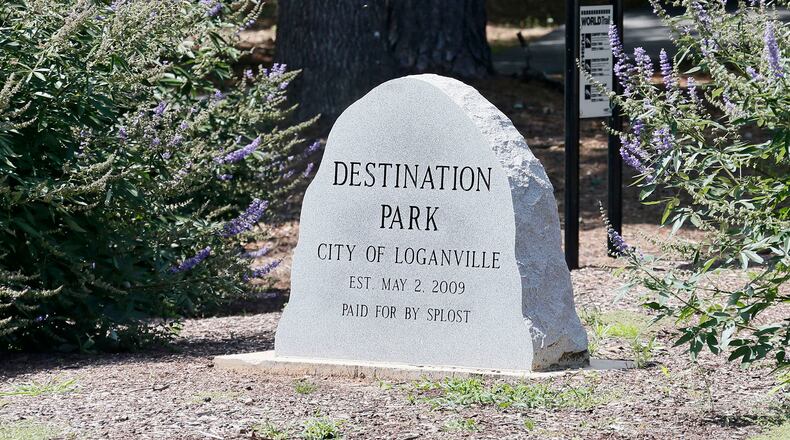GWINNETT’S SPLOST RENEWAL
Length: Three years
Term: April 1, 2014, to March 31, 2017
Estimated revenue: $498 million
Cities' share: 21 percent
* Uses: Transportation, $347.7 million; public safety facilities and equipment, $74.6 million; recreational facilities and equipment, $47.2 million; library relocation, renovation and equipment, $11.8 million; senior citizen facilities, $5.9 million; parking, $4.2 million; administrative facilities, $4.1 million; and water and sewer improvements, $2.4 million.
* These figures represent spending by both the county and city governments.
Opponents of Gwinnett County’s special purpose local option sales tax say the penny tax isn’t special anymore.
Instead, they argue, it has become a permanent fixture in the state’s second-largest county, which uses it to supplement the county government budget for expensive items such as road paving, police cars and parkland. Those items should more properly be paid for through the issuance of bonds, or from property tax collections, they say.
Proponents of the tax say SPLOST is responsible for a high quality of life and has allowed the county to maintain a stellar bond rating because they have been able to fund all those things without going into debt.
The three-year renewal will be on Gwinnett County ballots Tuesday. It is estimated to raise $498 million, with about 21 percent of that going to the county’s 16 cities. County officials have said about 70 percent of the money from their share will be dedicated to transportation projects.
Duluth homeowner Billy Wise, who sits as an alternate on a citizens committee that evaluates Georgia Department of Transportation projects, said he will vote against the tax because it’s impossible for citizens to know how much benefit will be derived from projects funded with it.
“This has become a perpetual tax,” Wise said. “When you have a perpetual tax, it robs (government leaders) of any desire … to reduce costs. The largest chunk of the money will be spent on transportation projects, and you as a voter have absolutely no idea what you’re going to get for the money.”
Charlotte Nash, chairwoman of the Gwinnett County Commission, said state law calls the sales tax “special” to distinguish it from other types of sales tax. Specifically, the local option sales tax, such as the one in Fulton County, stays on the books indefinitely unless voters approve a referendum to end it. With the special purpose version, the tax is collected for a specific number of years, and voters must periodically renew it.
Beyond that, Nash said, the SPLOST has literally made Gwinnett a special place to live.
“More than a billion dollars in road improvements without a penny of debt seems pretty special to me,” Nash said. “SPLOST has played a significant role in making Gwinnett … a community with what is seen as one of the best local road networks in the state, with superior public safety equipment and facilities, with a park system that was named the best in the nation, and with an award-winning library system.”
The tax has a history of passing at the ballot box, although its popularity has waned over the years.
The first SPLOST passed in 1985, with 88.5 percent of the vote. All proceeds from that tax were used to build the Gwinnett Justice and Administration Center. The 1988 SPLOST had 66 percent of voters approving it for three big capital projects — the county’s pretrial detention center, its civic center and a renovation of the historic courthouse in Lawrenceville.
That would be the last overwhelming victory for nearly 20 years.
The 1992 version of the tax, dedicated solely to transportation projects, barely passed with 52 percent of the vote. It failed four years later, but was reinstated the next year with 53 percent of the vote.
Since then, the tax has been renewed three times, but only received more than 56 percent of the vote once — the 2005 version, which was approved at a 65 percent clip. The 2009 tax passed with 56 percent of the vote.
Chris McClurg, an attorney who argued against the tax during a recent debate, said county commissioners have become “slaves” to the tax.
“Instead of planning and putting money away, they’re counting on SPLOST,” McClurg said, adding that the tax has allowed to spend money on “wants” instead of “needs.”
But spending money on wants is OK with Paige Havens, co-chairwoman for this year’s Vote for Gwinnett’s Future SPLOST campaign. She said the tax provides benefits that touch residents every day, from soccer fields and police cars to good roads and sidewalks.
“SPLOST equals quality of life to me,” Havens said. “SPLOST means I don’t have to settle for the minimum. I can have a little bit of what I want, in addition to what I need.”
About the Author
Keep Reading
The Latest
Featured




